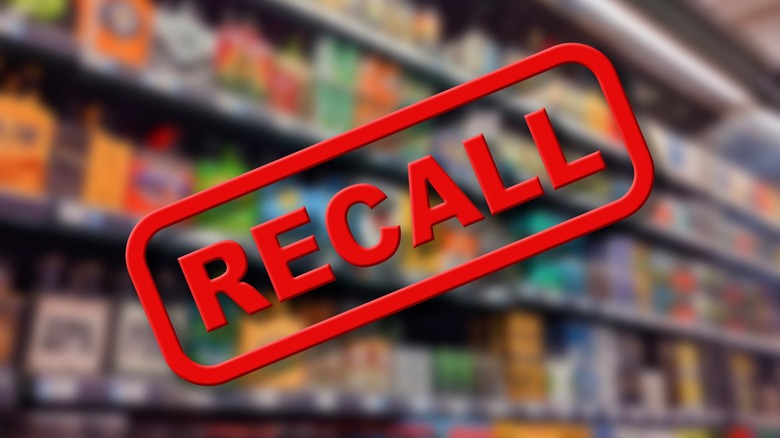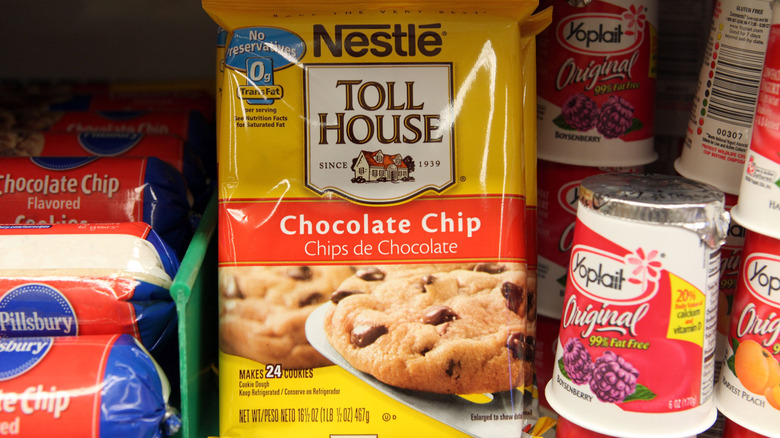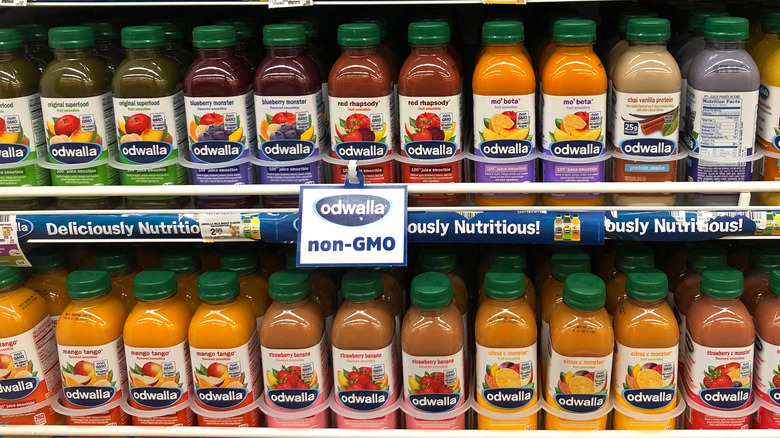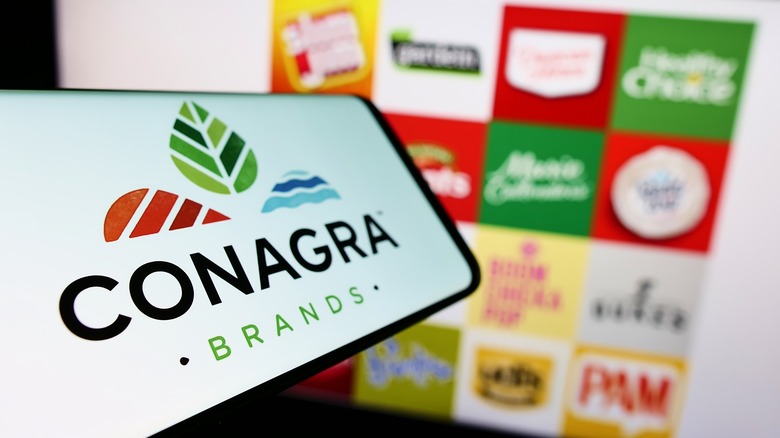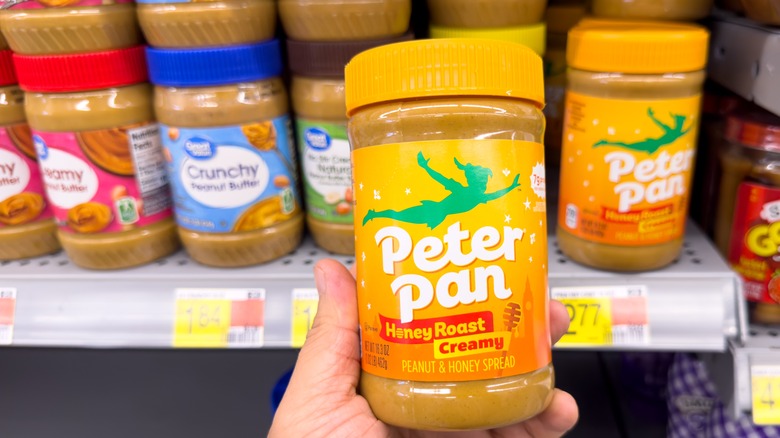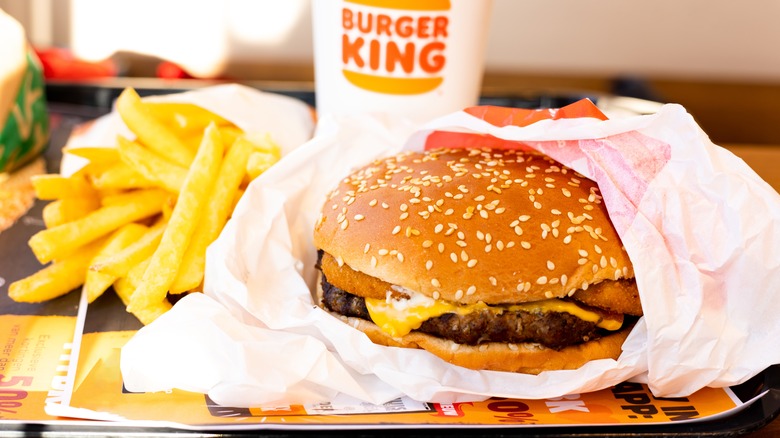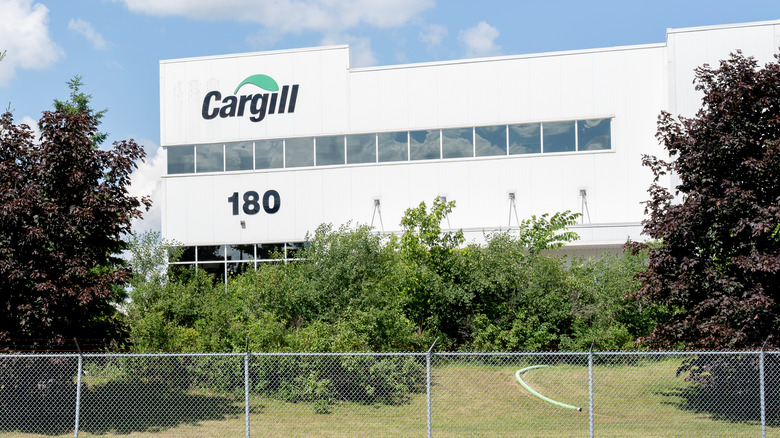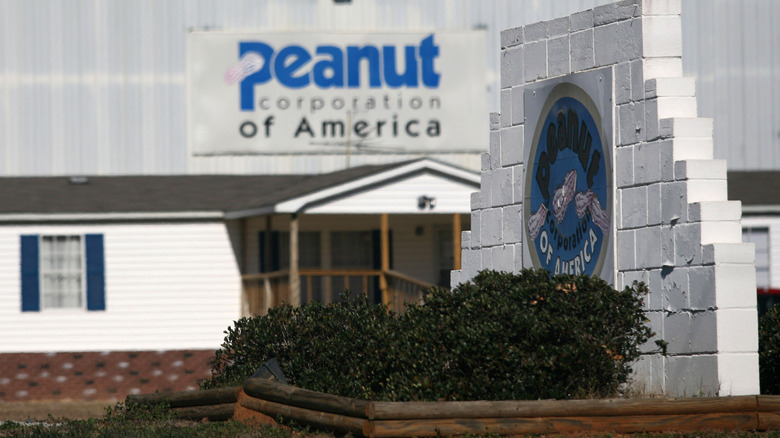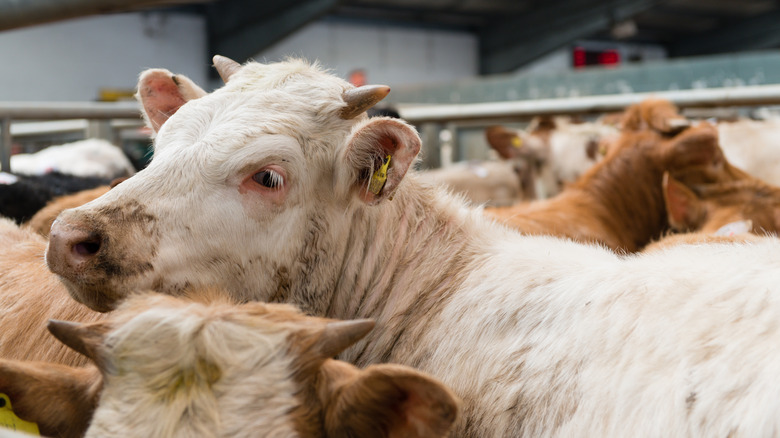The Biggest Food Recalls In US History
Humans have been getting food poisoning practically ever since we started eating food. Still, while the first food safety law in the U.S. was established in 1785, the first major food recall wasn't until nearly 200 years later. In 1973, 75 million cans of mushrooms were recalled due to botulism contamination. Since then, hundreds of food recalls have been issued every year, some small and others massive.
Recalls on food happen for many reasons, including undeclared allergens or poor product packaging, but the most common reason by far is contamination. Sometimes this is due to contaminants like lead and other heavy metals, as was the case in the 2023 baby food recall; however, as you'll see below, this contamination is often the result of bacteria such as E. coli, listeria, and Salmonella, which can cause food poisoning and even death. We've combed through history to find the largest-scale food recalls in the U.S.
Nestle recalled 3.6 million packages of cookie dough in 2009
You've probably heard that you're not supposed to eat raw cookie dough. Most people blame eggs for this, as they can cause Salmonella poisoning. Unfortunately, even egg-free cookie dough is still unsafe to eat raw. This is thanks to raw flour, which can harbor bacteria including E. coli and Salmonella.
In 2009, over 70 people across 30 U.S. states became ill with the same strain of E. coli. This outbreak was particularly odd since, according to the CDC, 65% of victims were under the age of 19 and 71% were female. After some digging, the USDA concluded that the culprit was none other than refrigerated, prepackaged Nestle Toll House cookie dough. Further investigation revealed that the flour used for the cookie dough was most likely the cause. The outbreak didn't result in any deaths, but 10 patients came down with hemolytic uremic syndrome (HUS), a condition that affects the kidneys and the blood's ability to clot.
In fairness to Nestle, had consumers baked all the dough instead of eating it, this wouldn't have been an issue; however, Nestle ended up recalling 3.6 million packages of chocolate chip cookie dough, updating its packaging to make the dangers of eating raw dough more clear. Since 2010, the company has been using heat-treated (pasteurized) flour in all its raw cookie dough.
Odwalla recalled 13 apple juice products in 1996
In the 1860s, Louis Pasteur invented pasteurization, the process of heating a product to kill off its bacteria. While Pasteur used this process on beverages like wine and beer, today, the term "pasteurization" likely makes most people think of milk. Still, many different products undergo pasteurization for safety reasons, including juices.
The need for pasteurization became abundantly clear in 1996 when Odwalla's unpasteurized apple juice was found to be contaminated with E. coli. The company ultimately recalled 13 different products made with unpasteurized apple juice, many of which had been sold to vendors like Starbucks. Over 65 people in the western U.S. and British Columbia fell ill, with over a dozen of those developing HUS. One child died as a result of complications from the E. coli poisoning.
Over the course of its investigation, the FDA found numerous health code violations at the company's California plant. While investigators were unable to conclusively name the bacteria's source, they suspected it came from specific apple orchards. As a result of the investigation, Odwalla pled guilty to 16 criminal charges, paid a fine of $1.5 million, and started pasteurizing all its juices. You won't be able to drink Odwalla again, though — the company was bought out by Coca-Cola and ultimately shuttered.
ConAgra Beef Company recalled 19 million pounds of ground beef in 2002
Ground beef is a super flexible cooking option and a great way to make weeknight dinners easier. Unfortunately, ground beef and other meat products are frequently recalled. Major food manufacturer ConAgra dealt with this in 2002, when its ground beef products were found to be contaminated with E. coli. Initially, the USDA's Food Safety and Inspection Service (FSIS) recalled 354,200 pounds of ground beef, but a few weeks later, the agency increased that recall to 18.6 million pounds.
At the time of the first recall, no one had fallen ill; however, 46 people would eventually become sick across 16 states, though fortunately, none died. Ultimately, the USDA blamed both ConAgra and the FSIS for the outbreak. An audit discovered that the FSIS had cited ConAgra for fecal matter on beef carcasses in the past but had given the company little more than a slap on the wrist.
After the review, new measures were put in place at the Greeley, Colorado plant where the outbreak occurred; however, the USDA temporarily closed the plant later due to repeated failure to avoid fecal contamination. ConAgra continues to struggle with recalls, issuing a major canned meat recall in 2023 and recalling over 245,000 pounds of chicken strips entrees in 2022.
Peter Pan recalled three year's worth of peanut butter in 2007
ConAgra found itself in hot water again in 2007 when peanut butter products manufactured in its Sylvester, Georgia plant were found to be contaminated with Salmonella. Three years' worth of peanut butter from its Peter Pan and Great Value brands were recalled, causing one of the biggest food recalls in Walmart history. Additionally, both Sonic's and Carvel's peanut butter toppings had to be recalled.
In total, over 600 people were poisoned across nearly every U.S. state, though fortunately, no one died. Company officials claimed that a leaking roof and malfunctioning sprinkler system were to blame for causing the bacteria to grow on peanut plants. They also claimed they had no idea the products were contaminated, even though their peanut butter samples had tested positive for Salmonella in the past.
ConAgra agreed to pay $11.2 million in fines, which was then the highest-ever fine for a food safety case. $8 million of that some was in criminal fines, and the remaining $3.2 million was in forfeitures to the federal government. The company also paid out $36 million in civil settlements and spent $275 million on new procedures and upgrades to the plant.
Topps Meat Company recalled 21.7 million pounds of ground beef in 2007
Later in 2007, Topps Meat Company issued what was, at the time, the second-largest beef recall in U.S. history when it recalled over 21 million pounds of ground beef products. The USDA had found the brand's frozen hamburger patties to be infected with a potentially lethal strain of E. coli. What started as a recall of over 300,000 pounds of the product eventually expanded to over 21 million pounds of ground beef manufactured by the company in its New Jersey plant.
This was a year's worth of production, and it had been sold not just in supermarkets but to places like schools and hospitals. At least 30 people across eight states had E. coli infections that linked back to the contaminated ground beef. There were no fatalities.
Some of these illnesses could have been prevented, as the USDA admitted that it took several weeks to announce the recall after the first positive test. Topps Meat Company immediately shut down its factory, and six days after the expanded recall, the 67-year-old company closed its doors for good.
Hudson Beef recalled 25 million pounds of ground beef in 1997
While the Topps Meat Company recall was the nation's second-largest ground beef recall at the time, the largest was the Hudson Beef recall of 1997. The USDA found that hamburger patties from the company's Columbus, Nebraska plant were contaminated with E. coli, resulting in a recall of all products that originated from that plant — this turned out to be 25 million pounds of ground beef. The plant closed immediately until new safety protocols could be put in place.
Despite this recall being larger than Topps', it resulted in fewer people infected, with only 15 illnesses — and no deaths — linked to the outbreak. The recall was also one of the worst fast food recalls in history, as Hudson Beef was the supplier for Burger King. A few weeks after the recall, Burger King severed ties with Hudson Beef and found a new supplier.
A few weeks after the recall, Tyson Foods purchased Hudson Beef, including its closed plant, for $642.4 million. Additionally, two Hudson Beef employees were indicted on federal charges of providing false information to the USDA regarding the recall. Ultimately, however, they were acquitted due to a lack of evidence.
Pilgrim's Pride recalled 27.4 million pounds of deli products in 2002
There's no kind of food poisoning out there that's fun, but one of the most dangerous of the bunch is listeria. While E. coli and Salmonella cause gastrointestinal distress, listeria can cause problems like headaches, a stiff neck, and seizures, according to the CDC. It can also lead to miscarriage, stillbirth, and early labor, which is why pregnant people are advised to stay away from cold deli meat.
Listeria in deli meat was the cause of the 2002 Pilgrim's Pride recall. The company recalled 27.4 million pounds of deli poultry after the bacteria was found in the floor drains at one of Pilgrim's Pride's processing plants. At the time, this was one of the largest meat recalls in U.S. history.
This outbreak was incredibly dangerous, killing seven people, sickening 46, and causing three miscarriages. The plant shut down for a month, during which new cleaning methods were implemented and employees received additional health and safety training. In 2011, the company issued another recall after listeria was found in two of their Texas plants, though no illnesses were reported in this case.
Natural Selection Foods recalled spinach from 34 brands in 2006
Throughout the history of food recalls in the U.S., spinach and other leafy greens have been recalled dozens of times for E. coli, listeria, and Salmonella contamination. One of the largest of these recalls occurred in 2006, when an E. coli outbreak prompted the FDA to issue a warning for all bagged spinach nationwide. Eventually, the outbreak was linked back to the manufacturer Natural Selection Foods.
The FDA's warning had caused stores to pull all bagged spinach off their shelves, but Natural Selection Foods issued an actual recall of 30 different brands of bagged spinach. In an investigation, the FDA discovered that only the Dole brand was contaminated. The agency was unable to conclusively say how the contamination took place but determined that it most likely originated from one specific farm and spread during processing.
By the time the outbreak was over, the CDC had confirmed 205 cases of E. coli associated with the outbreak. This included 104 hospitalizations, 31 cases of HUS, and four deaths across 26 states. About two weeks after issuing the warning, the FDA announced that bagged spinach was once again safe.
Sara Lee recalled 35 million pounds of deli products in 1998
Before the Pilgrim's Pride deli meat recall of 2002, there was the Sara Lee deli meat recall of 1998. Sara Lee is perhaps best known for its sandwich bread and hot dog buns, but the brand also makes other food items, including deli meat and hot dogs, the subject of this recall. Initially, the company recalled 15 million pounds of meat due to listeria contamination, but that eventually expanded to 35 million total pounds.
This was a particularly deadly outbreak. It ultimately caused 15 deaths and six miscarriages, and it made at least 80 people sick. The outbreak was traced back to Bil Mar Foods, a Sara Lee-owned meat packing plant in Michigan. An unhealthy amount of condensation was blamed for the contamination, and while the USDA was aware of the issue, it merely issued the plant a citation.
Eventually, Bil Mar stopped testing for contamination altogether. While the federal government didn't have proof that the plant was intentionally shipping tainted meat, the Bil Mar plant did plead guilty to one count of preparing and selling adulterated poultry and meat products. Sara Lee agreed to pay a $200,000 fine, spend $3 million on food safety research, and settle a $1.2 million lawsuit.
Cargill Meat Solutions recalled 36 million pounds of turkey in 2011
While ground beef is a commonly recalled product, the 2011 Cargill Meat Solutions recall can be traced back to ground turkey contaminated with a multi-drug resistant strain of Salmonella. While Salmonella poisoning is unpleasant in general, this strain was resistant to many common antibiotics, making it more difficult to treat. Cargill ended up recalling 36 million pounds of ground turkey that was sold under multiple brand names.
This seven-month-long recall ended with 136 people falling ill across 34 states. At least 37 people had to be hospitalized, and one man died. Unfortunately, the recall wasn't issued until after the man's death, despite the FSIS discovering evidence of contamination several months earlier. In response to criticism, the FSIS claimed that it didn't have enough evidence to warrant a recall until July, even though the recall was issued in August.
In response to this recall, Cargill closed production at the contaminated plant so it could be thoroughly cleaned. It also hired a panel of experts to help them create an aggressive Salmonella monitoring program. Just a few weeks later, however, the company was forced to issue another recall, yet another in a long line. Another recall, this one for Walmart-sold ground beef, was issued in May 2024.
Wright County/Hillandale Farms recalled over 500 million eggs in 2010
Eggs are a versatile kitchen staple. There are tons of different ways to cook eggs, and they can also be used in everything from pasta to baked goods. It's a huge industry, with the U.S. consuming the equivalent of over 250 eggs per person every year (via The American Egg Board). This is why the 2010 Salmonella outbreak, which was caused by eggs, was so widespread.
The outbreak was traced back to Wright County Egg and Hillandale Farms, two Iowa farms owned by DeCoster Egg Farms/Quality Egg LLC. Salmonella was detected throughout the farms, including in the hens' feed mill. The two companies ended up recalling about 550 million eggs across 14 states. More than 1,900 illnesses were linked to this outbreak, but the CDC estimated there could be as many as 60,000 illnesses that went unreported.
As a result of the outbreak and subsequent investigation, Quality Egg was charged with — and pleaded guilty to — one count of bribing a public official, one count of introducing misbranded food into interstate commerce with intent to defraud, and one count of introducing adulterated food into interstate commerce. The company's owners, Jack DeCoster and son Peter DeCoster, each pleaded guilty to a federal count of selling adulterated food. This resulted in fines and prison time for both men.
Peanut Corporation of America recalled 3,913 peanut products in 2009
Just two years after the Peter Pan recall and one year before the Quality Egg recall, the Peanut Corporation of America issued a nationwide recall due to Salmonella in its peanut products. The outbreak began in September of 2008, and by the beginning of November, there were 13 cases across 12 states. By the first week of January, the CDC determined the outbreak was from peanut butter, and on January 9, the Minnesota Department of Health narrowed down the brand.
It wasn't until January 13 that the PCA began pulling peanut butter from shelves. They expanded the recall several times in the following weeks, eventually recalling nearly 4,000 different products, including peanut butter, peanut paste, and products made with those ingredients like cracker sandwiches and cookies.The Salmonella contamination led to over 700 illnesses and nine deaths.
Less than a month after the initial recall was issued, PCA filed for bankruptcy. A subsequent investigation revealed that the company had falsified records of testing. Multiple PCA officials were indicted on charges, and the former operations manager at the Georgia plant where the outbreak originated pleaded guilty to multiple counts, which resulted in jail time.
Hallmark/Westland recalled 143 million pounds of ground beef in 2008
As of this writing, the largest meat recall in U.S. history wasn't prompted by any deaths or even any illnesses. In fact, there was no outbreak at all. Instead, the 2008 Hallmark/Westland ground beef recall was issued after an undercover video revealed widespread animal abuse at the California plant. The video showed that the plant was slaughtering injured and ill animals, some of whom couldn't even walk, for food, which is a federal violation.
While this law is partially to prevent contamination from E. coli and Salmonella, to truly understand why this is so significant, we have to venture back a couple of decades and travel across the pond to the U.K.'s bovine spongiform encephalitis (BSE) outbreak. BSE, or mad cow disease, is a prion disease that occurs when someone eats infected beef. There is no cure, and cooking doesn't eliminate the prions. Although the USDA determined that the risk of BSE contamination was minuscule, the plant was still in violation of health and safety standards. Hallmark/Westland ended up recalling 143 million pounds of ground beef, including a large amount that had gone to schools.
The plant shut down while the USDA investigated. Federal abuse charges were brought against plant employees, and a judgment of nearly $500 million was levied against the company; however, the company had gone out of business by then, so the Humane Society was never able to collect the full amount.
